|
Hale Me Hearties! As we glide in on the first waves of the mighty holiday tide, we are thrilled to bring treasures of wisdom from not one but TWO award winning Young Adult authors. Fortunately for us, they have decided to spill their secrets for writing a top notch YA novel. These renowned and savvy ladies will provide valuable advice, tips and information to guide inspiring Young Adult authors in an increasingly competitive market. THE TEENAGE YEARS CAN BE STORMIER THAN ANY RAGING TEMPEST AT SEA! EXPERT ADVICE FROM AWARD WINNING AUTHORS THAT IS WORTH ITS WEIGHT IN GOLD DOUBLOONS! “To create a real world for teens in our times, you really need to know them: what they do every day, what they like, what motivates them, the environment in high schools and many other details. Home life for kids is very different from twenty or even ten years ago… The way teens react to situations is often repeated generationally. Some step up and become heroes and some melt down and need help from peers and mentors.” 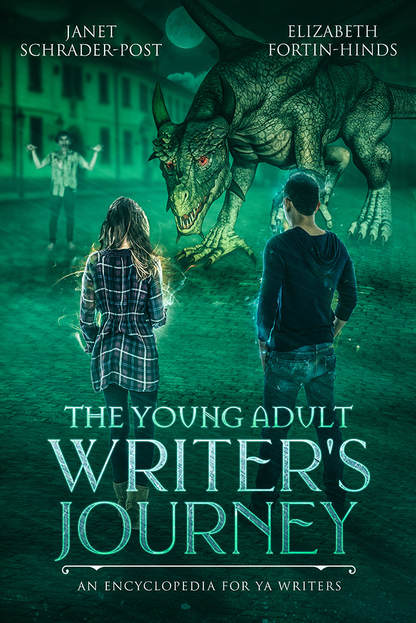 Praise: The trouble with “how to” books on creativity is that they usurp creativity. Not so with this very insightful guide for YA writing. If it doesn’t become a standard or even a classic among reference books, it will be an oversight. Janet Schrader-Post and Elizabeth Fortin-Hinds have all the marinated smarts and credentialed experience to pull this off, and they do! No dictated wisdom from on high here, no grafted creativity, THE YOUNG ADULT WRITER’S JOURNEY is accessible, motivational and a clear map that leaves plenty of room to discover for anyone wanting to explore their creative side.-Thomas Sullivan, Pulitzer-nominated author of THE PHASES OF HARRY MOON Finally, an all-inclusive book on young adult fiction must-do, don’t do and how-to. If you want to write a young adult novel, you need to read this book first. Coauthored by an award-winning YA author and an acquisitions editor, both experts on kids and what they like to read, this encyclopedia contains all you need to start or improve a career as a YA fiction author. From an examination of the market, genre and its sub-genres, to mechanics and the business, everything is at your fingertips. This amazing writer’s resource is written in a relaxed and interesting style, with plenty of contemporary references and examples for clear understanding and easier application. 1.What is it about the Young Adult genre that insures its popularity with both readers and movie audiences? JANET: I think people want the simpler stories, the fast pacing and the young characters to read about. There’s something about the struggle of a teenager approaching life and so many experiences for the first time that captivates audiences. They can cheer their success and mourn their failures easier than with a more complicated adult character. Everyone can relate because everyone either is going through it right now (teens) or they went through it (adults.) For adults there’s even a hint of nostalgia. A kind of, I remember doing that, or, I’ve been there mentality. ELIZABETH: Interestingly enough, I feel people like the complexity of the plots, the limitless possibilities and the grand scale world building of most YA stories. Like Janet said, kids don’t have preconceived boundaries and limits to possibilities that often result from the weightier responsibilities and obligations of many adults. They’re risk-takers and feel they’re immortal. They are experiencing the world and its wonders for the first time and frequently want to learn from their own mistakes rather than taking the advice of the more experienced older generation. 2. Do you recommend making outlines? What advice would you give to writers who are strictly pantsers? JANET: I always make some kind of outline. Even if your characters make their own decisions and take you off course, it’s important to know the basic plan for your story before you write. You write a more satisfying story one readers are sure to enjoy if you follow the steps of the young adult writers journey. ELIZABETH: I love to brainstorm the plot with a critique or writing buddy, especially because I love complicated plot twists. This is an ongoing process, since the characters like to change their minds and new obstacles are always popping up. I think that’s the pantser thing. I usually have a synopsis before I begin which outlines the main plot points—and is helpful for writing the cover blurb and tag lines. I think it’s especially important if you are writing a series, and that decision is best made, at least for me, before the first book is written. It’s a huge hassle to go back in and weave story elements that need to be foreshadowed in previous books. 3. Which YA novels, classics or contemporary, are among your personal favorites? JANET: There wouldn’t even be such fervor in the YA market right now if there had never been Harry Potter. He will always be a favorite. When I was a girl, I was horse crazy so Walter Farley’s Black Stallion series was a favorite. Andre Norton is another YA author who wrote in the sixties. I loved her Science Fiction. For modern YA, I enjoyed Hunger Games and Divergent. ELIZABETH: Growing up I read Nancy Drew, The Bobbsey Twins, Black Beauty, Little House on the Prairie, Little Women (had all the dolls), all the old favorites. I love International fairy tales and mythology and have collected them for years. It’s no wonder that I love the Court of Thorns and Roses series by Sarah J. Maas, and The Red Queen series by Victoria Aveyard. Urban Fantasy and Paranormal are my favorite YA genres. 4. What is your favorite YA novel that you’ve written and why? JANET: The first book in my series the Vagrant Chronicles, Vagrant, has garnered four prestigious awards. I got the idea from Leon Uris’s depiction of the Warsaw Ghetto. The Jews in the ghetto used kids to run through the sewers for medicine and food. They were small and could hide easier inside the city and people would help them. This affected me when I read the book as a kid and it’s why I created the Mole People and the Vagrants living underground in the big cities of a dystopian future. Vagrant is an awesome book, but my favorite has to be Voodoo Child. I love the characters, especially the homeless boy whose mom left him at Wal-Mart, and who lives in the store waiting for her to come get him. ELIZABETH: It’s the one I’m currently coauthoring with Janet, the first of a series, as it’s nearly done and will be the first one I’ve finished though I also have a spinoff to my Illuminati series that is YA. Getting books done is a huge problem for me as I spend so much of my time editing the work of others. Their deadlines always take priority. 5.Why do you think having bullies as characters is essential to YA plotlines? JANET: Everyone has been bullied at some point in their lives. It’s an essential part of growing up. How you dealt with it and how your characters deal with it makes for an interesting conflict. Conflict of any kind spices your book. It’s also a terrible problem in modern-day schools. My fifteen-year old gets bullied and she’s been in trouble for handling it herself. My middle son was bullied in the ninth grade and ended up suspended for fighting, but he was never bullied again. Overcoming adversity creates a bond between characters and readers who had similar experiences or who are having them. ELIZABETH: Sometimes, if you watch the news, it feels like we’re living in a culture of bullies. Everyone judges every word that’s said and bullies anyone they don’t agree with. So I think it’s important in realistic fiction, especially for kids, that the issue is addressed and not ignored. They need to see both sides of the issue, whichever side they relate to and the other side as well. Why kids bully, and what it feels like to be bullied, and ways in which it can be dealt with and the possible consequences. 6. Do you think the reading audience for Young Adult novels has changed over the past decade? JANET: One of the awards Vagrant recently won is a Best Book of the Year pick for New Adult. New Adult is the reader group from ages 18-30. Harry Potter began the trend of adults reading YA. It’s easy to read and a great way to escape into fun worlds where the problems are kid problems, not job, money, rent, car-payment, adult problems. More and more adults are seeking the escape of a great Young Adult read. And, of course, teens are reading it too. ELIZABETH: Simply put, it’s grown. The audience has grown and the number of really interesting YA books available has expanded as well as the market tries to supply the increased demand. 7.Why do you think so many screen adaptations of New York Times bestselling YA novels have flopped at the box office, e.g., ‘Beautiful Creatures’, ‘City of Bones’,and ‘Fallen,’ to name a few? JANET: Because Young Adult novels are usually written in a way that’s easy to translate into a movie, and also because of their universal appeal to both young and adult viewers, I believe they make a great choice for movies. They appeal to a broader audience. Many are set in dystopian futures or fantasy landscapes which make for great escape viewing. I also think YA books are in many ways similar to comic books, built to be easily read and understood with amazing characters, and Marvel comics opened up the eyes of movie-makers to the potential in young adult material. It doesn’t hurt that the Harry Potter franchise made movie-makers billions of dollars. ELIZABETH: I loved Beautiful Creatures. The Harry Potter series certainly didn’t bomb. Shadow Hunters (From the movie in 2013, from the book series) will conclude it’s 3rd TV series season in 2019. It didn’t bomb, the founder, Ed Decter, exited the series over "creative differences". I’ve not seen Fallen. I actually think a lot of YA books do well on the big screen. 8.Do you believe a YA novelist needs an agent or a Top Five publisher to get the word out? Is having a presence on social media essential? JANET: There is so much material out there, it’s hard to say whether getting a Top Five publisher will even make a difference. The Top Five are now offering digital-only contracts. They know the market is changing. Social Media is important because if someone does read your book, they may want to look you up on say Facebook or Twitter and see who you really are. Your face and how you present yourself on Social Media is critical, but whether it sells books or not is doubtful. Reviews on amazon, word of mouth, conferences, contests, are all better ways to get the word of your work out to the public. ELIZABETH: Good question. Here’s a few facts a lot of people aren’t aware of. If you have a book with the Big Five NY Publishers, in both ebook and paperback, the average book sells 3000 copies over its entire lifetime. The first year, you can expect it to sell around 250-300 copies. Only outliers, like 1% of the million books published each year will sell impressive numbers, like 100,000 copies plus. The other 99% will sell the former. If you are paying 15% of your royalties to an agent, your income just drops. Your biggest possibility for sales is to try to get into bookstores and libraries. Even independent publishers make their books available to these outlets, and if you are thinking to go solo and just publish on Amazon, your retail opportunities can drop even further. Any author who is in it to get rich or who doesn’t think their personal online interactions, book club participation, virtual book tours, book signings or other ways of getting their work in front of the masses matters is out of touch with today’s book business, and they are in that business even if they feel all they need to do is write. 9. Many of the new crop of contemporary YA novels explore sensitive and controversial topics like drug addiction, self-harm, and gender identity issues. What’s your take on why this is happening? JANET: The modern world of teens is dangerous and crazy. With school shootings being addressed in every high school, teen suicide rates high, gay kids, while finding a better acceptance, are still suffering discrimination and bullying, single-parent kids, and kids of divorce and kids of drug addicts, navigating the world of high school is hard. There are many sensitive topics, but the controversy and the conflict make great stories as do the trials, successes and failures of the teens in those stories. ELIZABETH: With the way social media is delivered today, and the fact that almost all kids have some kind of access to it, there’s nothing they don’t see or hear. They are living in the real world, and like it or not these issues exist in their lives. They like to read about kids having some of the same problems they or someone they know is dealing with and see how the character deals with it. They like to see someone with real problems overcome obstacles, and though they might not always win, they always come away with hope. 10. Tell us about a character in your own novels that you fell in love with. JANET: I loved Oscar in Voodoo Child. He was overweight and carried a hamster named Jerry around in his backpack. Kids bullied him for numerous reasons. His mother was an alcoholic. She dropped him off at Wal-Mart and said he should wait for her. So he moved into Wal-Mart and with the help of his friends kept going to school. He was sure she would come back for him. She always did. He was so complex and so simple at the same time. Brave and scared all in one. He never gave up on his mom. You had to love him. ELIZABETH: I love Gran. She’s a foul-mouthed, blunt, straight-talking old woman in Annabelle and the Jackal, the YA fantasy I’m currently writing with Janet. She’s unexpected comic relief and also a stalwart part of team Jackal. 11. Is it difficult as a mature writer to relate to the angst of the teenage years? JANET: My teen years were very tough so that would be a no. It’s easy to remember what it was like and easy to relate. I also covered high school sports and events as a reporter. I saw so much to admire in teens. Their struggles to succeed, often in the face of great adversity was touching. Every child who successfully navigates high school and makes it into college deserves an award. Teens are funny, they’re tougher than they think. They can be mean and they can be generous. I think if you write about them, you have to care about them. ELIZABETH: I suffered a lot of loss and hardship as a kid. I wrote the book on angst. It might be why I worked with troubled and disadvantaged kids for most of my career. There is very little I didn’t see or hear about, first-hand. 12. Is Young Adult fiction the wave of the future? JANET: I certainly hope so. I can’t predict. Books are teetering on the brink of extinction. Fewer and fewer people read. But the ones who do are avid readers and many of them are reaching for YA novels. ELIZABETH: They’ve been around for as long as there have been kids and I don’t see them going away any time soon. Their popularity just seems to keep growing. 13.What YA projects and/or appearances loom in the future for you both? JANET: Elizabeth and I are writing a book together right now with the working title Annabelle and the Jackal. It’s YA/New Adult fantasy and a play on the old fairy tale Beauty and the Beast. I have a book coming out November 30. The second book in the Vagrant Chronicles, Mutant, written with my son Gabe Thompson, that follows Logan and Shayna into space and then back to Earth to rescue the vagrants left on Earth being pushed out of existence by a new and terrible character called Drayvon, a mutant. I have another book written with my son Gabe Thompson, Valley of the Golden Mummies, not YA but adventure fiction, coming out in December. ELIZABETH: As Janet said, we’re almost down with book one in our series. I also have a YA spinoff I mentioned earlier. release day!Alas, it would appear that our esteemed guests have a bounty of grand advice for the aspiring YA author! We thank them for joining us at the Captain’s table and sharing both their time and wisdom .Be sure to grab your copy of this epic guide to launch your own Young Adult novel now!
I remain your humble servant, Patricia Mattern, Mistress OF Madness, THE WHIMSICAL HERALD
6 Comments
|
Patricia MatternMistress of Madness NEWS!Well, do you have any idea why a raven is like a writing desk?
Lewis Carroll, in 1897, proposed this answer, "Because it can produce a few notes, though they are very flat; and it is 'never' put with the wrong end in front!" (raven, spelled backward, is nevar aka never...or as we like to say here at TT...never more!)
Archives
November 2021
Categories
All
|
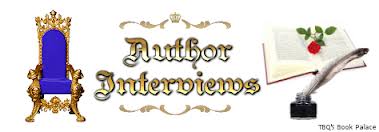

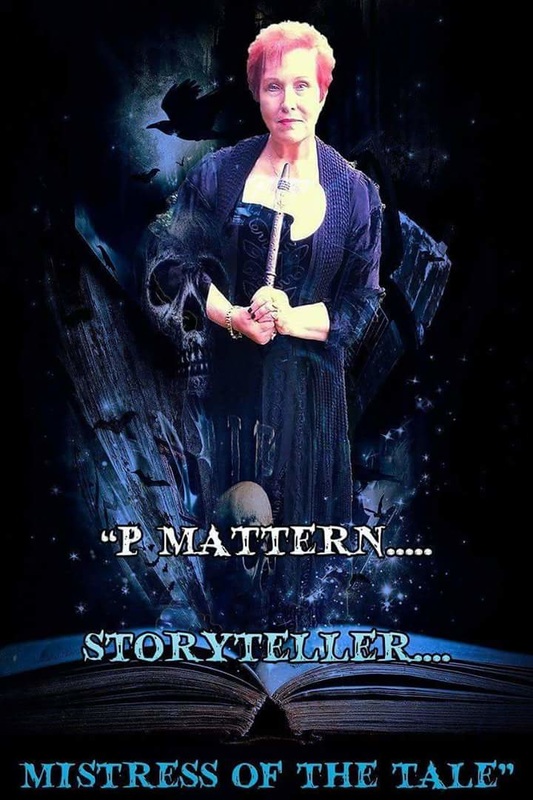

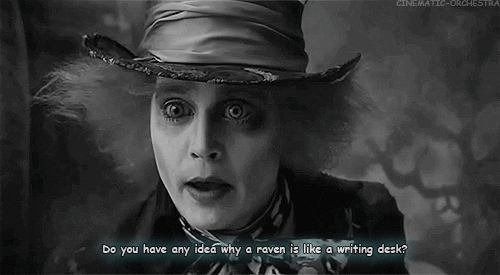
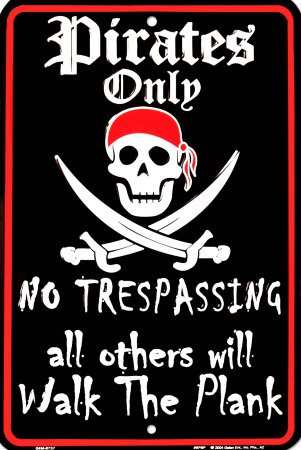
 RSS Feed
RSS Feed